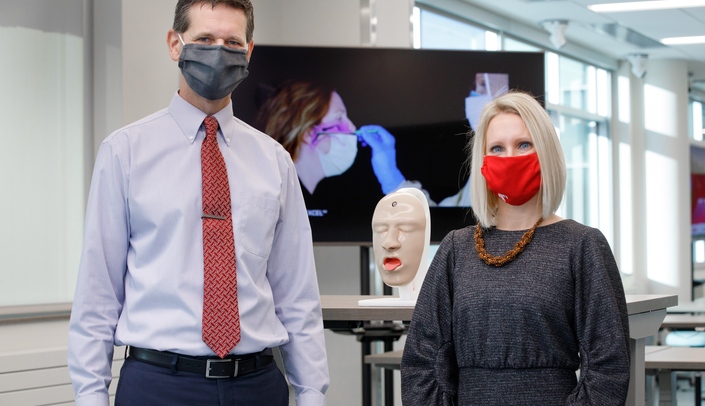Nasopharyngeal swabs — collecting a specimen in the nose — have been done millions of times worldwide to test for COVID-19, but they can produce false negative results when not done correctly. Improper swabbing also can injure patients with certain nasal conditions.
The University of Nebraska Medical Center’s iEXCEL team have created an advanced model to help improve the skills of those performing the swabs. Five Oral Nasal Pharyngeal Anatomy Clinical Education trainers- called ONPACE – are now available at the Davis Global Center.
"When we were faced with this pandemic, we realized that millions of frontline workers were having to learn a procedure that they had never done before or were not as familiar with," said Christie Barnes, MD, assistant professor and rhinologist in the UNMC Department of Otolaryngology-Head and Neck Surgery. "The key to a proper nasopharyngeal swab involves the direction and depth of the swab being inserted and the ONPACE trainer helps to solidify those key aspects.
"We are committed to ensuring our frontline swabbers are equipped to do the procedure well and are excited at the potential this will have on patients nationally and internationally."
Dr. Barnes and colleague Jayme Dowdall, MD, and Ben Stobbe, iEXCEL assistant vice chancellor for clinical simulation, were part of a team to create ONPACE. They collaborated with other UNMC faculty members, Nebraska Medicine, UNeMed and the Massachusetts-based Chamberlain Group.
The Chamberlain Group created the anatomically accurate model to mimic tissues and structures of the oral and nasal cavities from a CT scan. The group has been designing, developing and manufacturing anatomical trainers for clinical training for more than two decades. Early in their careers, founders Lisa and Eric Chamberlain worked in the visual effects industry on such feature films as Superman, Predator, Eraser and The Matrix.
In early 2020, COVID-19 swab training was done on airway models already on hand, Stobbe said, but trainers wanted a more advanced teaching tool.
He said the one-of-a-kind, portable trainer is the most sophisticated and realistic available. It also is designed to test for infections such as strep throat, flu and to diagnose some ENT issues.
Like the classic game "Operation," color-coded indicators provide feedback on whether learners are doing the procedure properly. Instructors can watch through the clear side of the model to teach anatomy and correct swab insertion.
UNMC ENT faculty soon will publish a study on how to teach proper swabbing.
The Chamberlain Group will market and distribute ONPACE, which can be used to train health professionals including in physician offices, hospitals, clinics, and colleges and schools that train health professionals.
"The model is packaged with education and clinical expertise," said Dr. Dowdall, assistant professor and laryngologist in the UNMC Department of Otolaryngology-Head and Neck Surgery. "This is a paradigm often used for medical devices, but has not made it to educational simulation. With this model, we hope to get the most valid test results, with the most comfort to patients, while instilling confidence quickly to caring practitioners. We realized a simple procedure had a lot of chances for error. The trajectory of swabs we saw being performed on TV news, in addition to the reports from health professionals, told us we had an opportunity for education."
UNMC faculty began training health professionals early on when COVID-19 infections began and have trained Nebraska Medicine staff, Nebraska National Guard personnel and staff at the Douglas County youth detention center. The iEXCEL team also has conducted Facebook Live training for health professionals in rural Nebraska.
